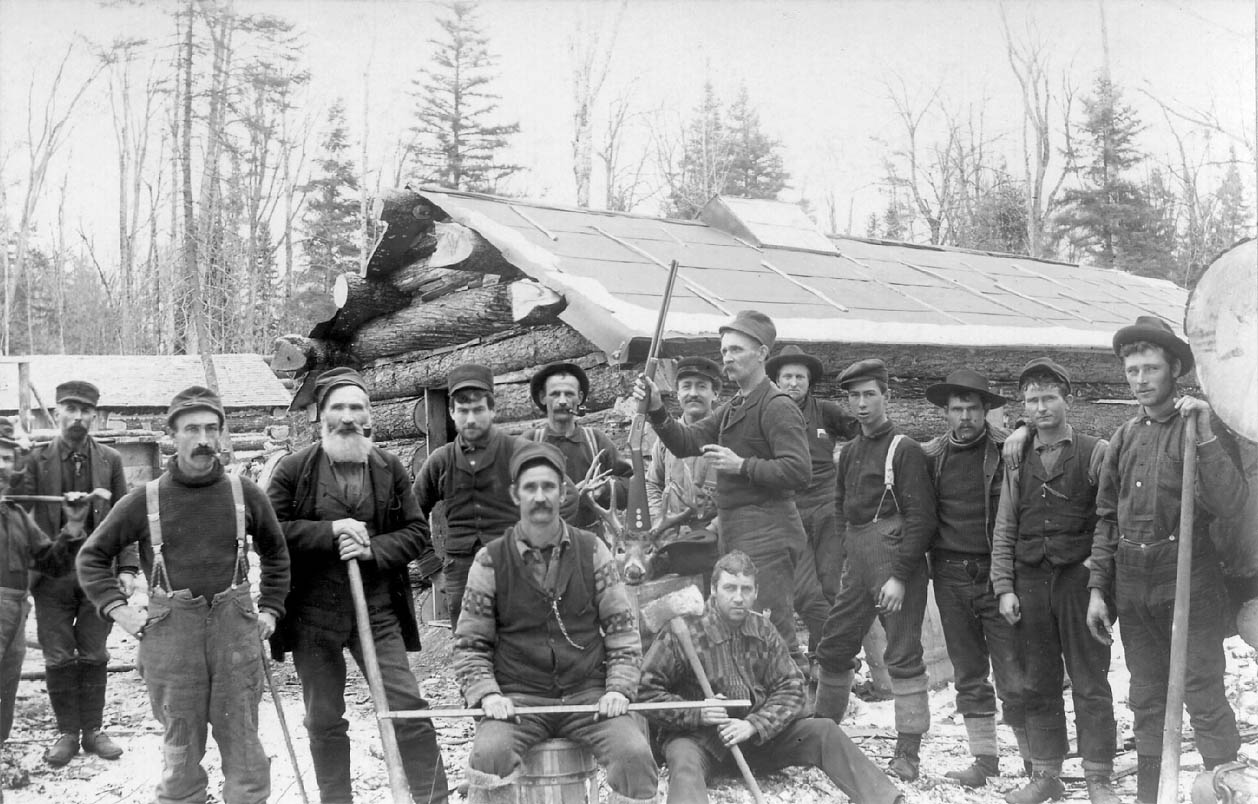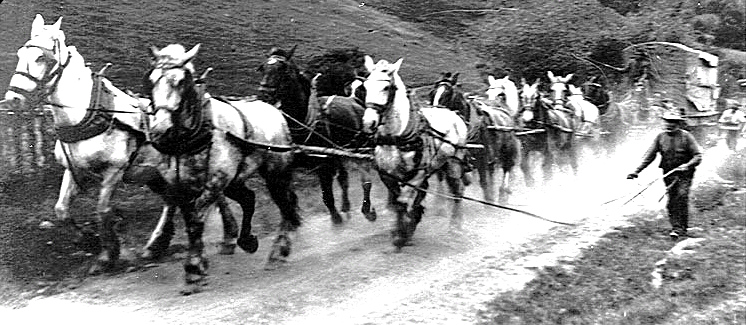
George
didn't realize it, but the music-like sound he was enjoying was
one
that his great-grandchildren would refer to as "endangered." This
"music"
wasn't coming from a brass or stringed orchestra, but from the mode of
transportation of his day. Two teams of strong, work horses
pulled
heavy wagons up the steep incline leading into the camp. The symphony
of
sounds came from the rhythmic hoof beats, jingle of metal
harness
hardware, wheel bands of iron crushing stone, and the
creaking,
tortured oak frame of an overloaded wagon. Combined, they
created
a sound which would one day be replaced by rattling,
smelly,
diesel engines.

George worked as camp cook. To hear some talk, he was the best cook the railroad had ever hired. George's day started two hours before the others. This morning, after the tall, quiet, Swede slipped into his clothes, he silently opened the cabin door. Suddenly, before stepping out the door, George stopped cold--- as if he had turned to stone. When he lifted his eyes in the direction his stove-wood pile, he saw four deer checking out camp. What really stopped George wasn't the four Whitetail does, it was what stood behind them. Just beyond the rail grade, stood the largest buck he had ever seen!
Slowly reaching back inside the door, he felt for his loaded .38-55 rifle that he kept leaning against his bunk. The rifle was always loaded for just this sort of work. Up until now, his new rifle had been used to chase off troublesome bears and occasionally wolves. But this time, with any luck, it would change the camp menu! Carefully, with slow smooth movements, he raised the gun and took careful aim. Very slowly he squeezed the trigger. . . the gun gave off its thundering report! The once peaceful forest seemed to echo back ten shots in return for his one! The ear splitting discharge from the rifle was still echoing as George saw his target bound off out-of-site down the opposite side of the grade.
As he
ran
in the direction of his prey, right behind him were some angry, puzzled
men. Most were only clad in their sweat-stained red flannels. By
the time the men caught up with George, they were awake enough to
figure
out what had just happened. When atop the grade, they stopped
cold.
Each one stared in disbelief at George who was kneeling by a giant
buck!
Each man smiled as he realized that this meant a break from the usual
jerky
and beans!
Without the
camp boss
saying a word, the workers took over the task of dressing the
buck.
As George walked through the group returning to his morning duties, he
received slaps of "Great job," on his back.

All
that
was
over fourteen hours ago. Tonight, as the wagons pulled into camp with
the
tired, track laying,"Gandy Dancers," there was very little talk.
Despite their tired condition, each face wore a smile. Perhaps that was
because the air was filled with the aroma of hot venison stew and
biscuits,
something the men had looked forward to all day.
Today, the only
thing
left of the old rail camp is the now trackless grade itself. The
shallow
indentations in the ground where buildings once stood are almost
invisible.
Beep! Beep! My
detector
sounded off, signaling a buried target. I swept the target again
watching
the I.D. screen on the Minelab Explorer. The readout suggested a coin
target
at over six inches deep. After scrapping away a layer of leaves
and
decaying pine needles, I pinpointed the target, then started to dig.
What
I found was a very old copper shell casing. I knew it was old,
but
I didn't take the time to examine it closely. Several feet away from
the
first target, I received another coin-like reading. However when I
switched
into the pinpoint mode, I quickly realized the target was very large.
When
on an average coin hunt, I would have moved on to the next target.
This,
however, was a relic hunt and any old tool or antique hardware would be
exciting to find. Digging this target was more difficult because
of a tangled layer of roots. My prize turned out to be a huge,
old,
flattened cooking pot, I am sure dated to the early railroad days.
My
father-in-law,
Bob Heimerl, was running his trusty Whites 6000-DI in the woods. Today
, he was working without headphones and I soon realized the wisdom in
that.
As I wandered around in the deep woods, I could see how easy it
would
be to get real lost! Most of the time we were out of view of each other
and the beeping of his detector had a very calming effect on me.
Without
realizing it, my scanning pattern took me deeper into the
woods.
. . further and further from my skilled guide. When it occurred to me
that
I didn't know north from south or east from west, I stopped, pulled off
my headphones, then tried to get my bearings from the sound
of his detector. The woods were silent! I looked in all directions and
no matter where I looked everything looked the same. At this point I
couldn't
even tell which direction I came from--- panic started to set in! Just
as I started to feel my heart in my throat I heard the most beautiful
sound
in the world, the distant sound of the White's 6000-DI speaker. I
scurried in the direction of the sound! When I saw my
father-in-law's
tall, slender silhouette, I calmed myself, controlled my breathing,
then
wandered up to him as if there was never a problem. Oh, that male
pride!
Frankly, I was never so glad to see him!
 My father-in-law Bob, the
Woodsman!
My father-in-law Bob, the
Woodsman!
When we first arrived at this spot the beauty of the deep woods left me speechless. Bob pointed out to me the features of the old camp. Recently, the state of Michigan made a snowmobile trail which cut across the old grade and through a small part of the camp. . . I doubt if they even knew it was there!
I don't
call
him Dad to his face because I can imagine how it would feel to have a
49
year old overweight, bald guy call you " Dad." ("Slightly," overweight.
. . I remind my wife.)
Bob has loved the
woods
as long as he can remember. His father also worked the woods. While
working
in the timber industry, Bob raised a wonderful family, putting each one
through college. Bob is a logger from the old school. He understands
and
respects the woods and believes in good forest management.
Using his keen eyes during the years he worked in the forest, Bob made
mental notes of many "Ghost" areas such as this.
His work in the woods started at the close of the ‘crosscut saw
era.'
Chain saws were already available but still expensive, heavy and
undependable.
During the last few years, before his retirement, the trees had been
harvested
with giant hydraulic
shears mounted on special built tractors. But the
crosscut saw still plays an important role in the tiny U.P. town of
Amasa.
Each year the town
fills
with family members from almost every state like a special ‘town
reunion.'
The local fire department hosts a myriad of fun games and contests. . .
(not to mention great food, including the best sweet corn I've ever
enjoyed!)
One of the feature events is the crosscut saw competition. The night
before
the festivities, fire fighters place a large, freshly peeled log
on a wood cradle for the contest. Each year one of the firefighters has
the responsibility to get the saw to a skilled crosscut saw sharpener.
Usually it is Bob who gets this handled. . . this year presented a
problem.
Sadly the old, highly-skilled saw sharpeners are dying out! As it
turns out, this trade is quickly becoming a lost art!
Fortunately the
widow
of such a craftsman knew about Bob's dilemma. She offered
Bob
her late husband's tools along with a "good luck" wish.
Among
the tools was an antique crosscut saw sharpening kit complete with a
gauge
for setting the raker teeth height, a setting hammer and angle setting
jig. . . everything except a file! Even folded in the old box was a
fragile
yellowed instruction sheet which Bob studied very carefully. On the
afternoon
of July 3rd, he started the project. While I steadied the blade and
held
the light, Bob worked into the evening filing down both sides and
setting
the proper cutter angle. The next day at the crosscut competition, we
watched
with pride as the saw ate through the wood with ease!
Well, many of my friends ask about my vacation and the usual question is "Did you find any treasure?" The answer is yes! I got a chance to ‘touch the past' at the old railroad camp, I learned the old fashioned art of cross-cut saw sharpening. The best part for me was working with my father-in-law, solving the problem with the old saw blade. It reminded me of the precious times I had spent with my own father who I miss so very much. It may have been just another day for Bob, but it is a treasured memory for me.
As for
the
38-55 shell casing, was it the same shell ejected from the camp cook's
gun? Was the old stew kettle the same one George used to prepare that
meal
over a century ago? You could never convince me otherwise! I learned
that
the.38-55 was invented in 1884. The gun enjoyed an
excellent
reputation as a deer and black bear cartridge for woods hunting. Many
hunters
were forever convinced that due to the .38-55's greater bullet diameter
it was a far more effective
"big game
cartridge"
than
the .30-30 and not far behind the harder kicking .45-70. In its high
velocity
loading, it pushed a 255 grain bullet along at over 1500 feet per
second.
You see, there can be much you can learn from the little items we find.
And with a little imagination you can really "Touch the past!"
What a
great
hobby!